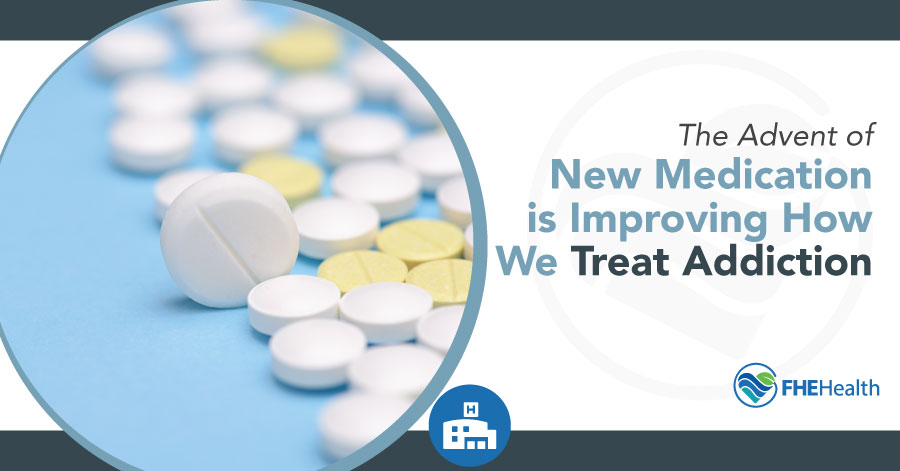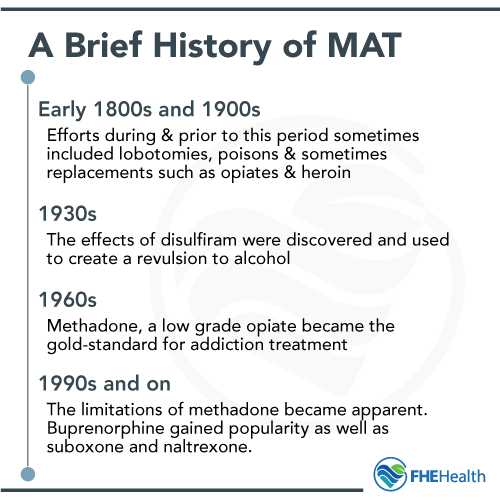
There was once a time in the United States when doctors tried treating alcoholics with morphine, believing that addiction to morphine would make them more functional than their addiction to alcohol. Today, we see how misguided it was, to a laughable degree.
But there’s nothing laughable about the idea of using a drug to treat addiction to a wide variety of substances. In fact, the practice — albeit in a very different and more heavily regulated form — has never been more prevalent than it is today.
We discuss the history of medication-assisted treatment and how MAT evolved from misguided addiction treatment to a tool used in fighting one of the worst epidemics of substance addiction in the past century.
History of Medication-Assisted Treatment
The 1800s and Early 1900s: Unregulated Addiction
 While there are centuries worth of records detailing speculative methods of treating addiction with other drugs, vaccines, lobotomies and even poisons, the onset of medication-assisted treatment as we know it today didn’t happen until the mid-1960s.
While there are centuries worth of records detailing speculative methods of treating addiction with other drugs, vaccines, lobotomies and even poisons, the onset of medication-assisted treatment as we know it today didn’t happen until the mid-1960s.
While addiction to alcohol has been around virtually throughout the history of man, opiates didn’t become a widespread issue in the United States until the Civil War. In the early 20th century, heroin was named a controlled substance, and medical professionals began searching for a way to treat addiction to heroin and similar substances. Initial efforts were misguided; doctors prescribed consistent doses of heroin, morphine or cocaine as a way to manage addiction.
The 1930s: Accidental Discovery of Disulfiram
The story goes, workers in a factory that used vulcanized rubber in the 1930s began to experience adverse effects when they consumed alcohol. This turned out to be due to the alcohol antagonizing drug disulfiram (brand names include Antabuse) entering their system.
This is because of the effect that would later make this drug a key candidate for a MAT substance: When a person has disulfiram in their system, even the smallest amount of alcohol makes them sick. This is called aversion therapy, and it has proven effective in treating alcoholism in clinical settings.
The 1960s: The Methadone Era
Efforts to treat addiction using other drugs continued, and in the 1960s, methadone, a lower grade opiate, was explored as an option. The reasons methadone was considered so promising are easy to understand:
- Patients who took the drug didn’t experience the same highs as they did with other opiates.
- Patients who took methadone didn’t build up a tolerance the same way as with other drugs.
- Methadone was effective in blocking the effects of other opiates.
- Methadone could be taken orally, eliminating the need for injections.
For the next half-century, methadone was considered the gold standard of medication-assisted therapy in opioid treatment programs. During this time, naltrexone (Vivitrol) and other drugs were patented for the same purpose, but it took longer for these alternatives to catch on.
The 1990s Onward: The Dawn of Buprenorphine
Downsides of methadone as a treatment — the drug shows up in urine tests for employment; it was never authorized to be prescribed and was only able to be given in a clinical setting — ensured that the treatment community continued the search for a better drug. In 1994, buprenorphine was developed with the promise that it could have many of the same life-changing effects in treatment without the significant downsides of methadone.
In 2002, buprenorphine (and several drugs with the chemical as their active ingredient) got FDA approval as the first treatment drug for opioid addiction that could be prescribed and dispensed outside of the clinical setting.
The drug has a lower potential for abuse than methadone, which is a key reason why clinics could prescribe buprenorphine in ways that they never could with previous drugs. This meant that buprenorphine (and later, Suboxone, Zubsolv and Sublocade) could be prescribed in an outpatient setting, and patients could take that prescription to a pharmacy, making addiction treatment much more convenient.
Modern MAT and the Regulations That Made It Possible
The history of medication-assisted treatment would look much different if not for a few key federal statutes that paved the way:
- Drug Addiction Treatment Act (DATA) of 2000: DATA expanded the Narcotic Addict Treatment Act of 1974 to include certain substances used to treat addiction. This made it possible for health care facilities to get waivers to prescribe drugs like Suboxone® to qualified patients of their facility.
- SUPPORT for Patients and Communities ACT of 2018: The SUPPORT Act of 2018 acknowledged both the effectiveness of the drugs covered by DATA and the growing severity of the opioid crisis, allowing eligible practices with a waiver to expand the number of patients they could treat to 100.
How MAT Has Changed Over Time
 Aside from the obvious changes in medication-assisted therapy since its earliest history — the drugs used in MAT have become more effective, the ways in which these medications are used has also changed.
Aside from the obvious changes in medication-assisted therapy since its earliest history — the drugs used in MAT have become more effective, the ways in which these medications are used has also changed.
For example, methadone is still an option to help patients stay clean, and Suboxone/buprenorphine is also used this way in some cases. On the other side of the coin, some of these drugs are used to suppress the effects of withdrawal.
Naltrexone is one, for example, that’s used to treat both alcohol abuse disorders and addiction to opiates. It effectively reduces cravings for these substances, making it easier for patients to undergo successful detox by suppressing the symptoms of withdrawal.
MAT Is Evolving to Treat Addiction Better
Medication-assisted treatment is just one way that the community is leveraging evidence-based techniques to find effective treatment paths for patients suffering a wide range of substance addictions.
While MAT is still considered part of cutting-edge addiction treatment, Suboxone® has become standard practices for heroin detox and recovery in many facilities, which is encouraging for the entire treatment community.
At FHE Health, we take pride in offering the latest and most effective clinical treatments for addiction and mental health issues. For more information about MAT or to learn about options for you or a loved suffering from addiction, contact us today.






